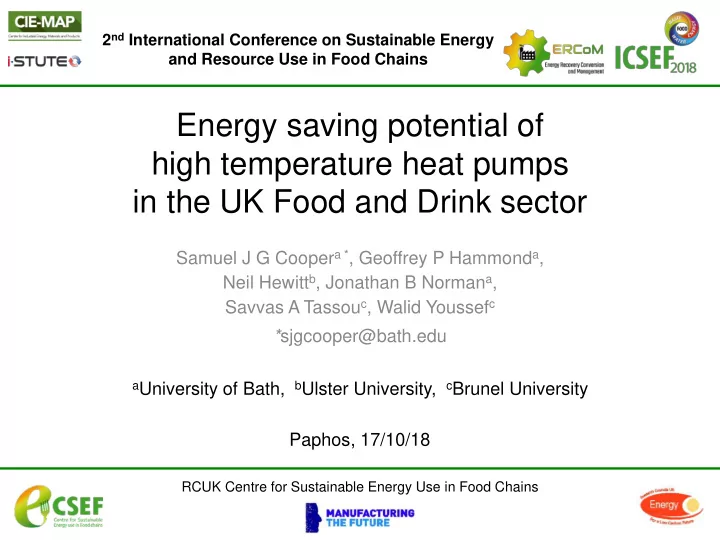

2 nd International Conference on Sustainable Energy and Resource Use in Food Chains Energy saving potential of high temperature heat pumps in the UK Food and Drink sector Samuel J G Cooper a * , Geoffrey P Hammond a , Neil Hewitt b , Jonathan B Norman a , Savvas A Tassou c , Walid Youssef c * sjgcooper@bath.edu a University of Bath, b Ulster University, c Brunel University Paphos, 17/10/18 RCUK Centre for Sustainable Energy Use in Food Chains
2 nd International Conference on Sustainable Energy and Resource Use in Food Chains Refrigeration and A/C Space heating Resource efficiency Process heat (up to 200°C) Circular economy Consumption perspective on emissions Prof. John Barrett Consumer preferences Product Longevity Industrial energy use and emissions Efficiency and drivers Prof. Geoff Hammond Prof. Neil Hewitt: g.p.Hammond@bath.ac.uk nj.hewitt@ulster.ac.uk RCUK Centre for Sustainable Energy Use in Food Chains Sam Cooper, University of Bath 2 sjgcooper@bath.edu
2 nd International Conference on Sustainable Energy and Resource Use in Food Chains Food and Drink / Dairy industry S. J. G. Cooper and G. P. Hammond, ‘Decarbonising’ UK industry: towards a cleaner economy, Proc. Inst. Civ. Eng, 2018. RCUK Centre for Sustainable Energy Use in Food Chains Sam Cooper, University of Bath 3 sjgcooper@bath.edu
2 nd International Conference on Sustainable Energy and Resource Use in Food Chains Method / Approach 1. Temperature requirements for each dairy heat demand • Direct replacement • Optimized replacement • Ambient temperatures • Availability of higher temperature heat (e.g. refrigeration) • Heat pump performance for those conditions (COP = Heat output / Electrical input) 2. Totals (weighted by demand) 3. GHG and fuel / electricity cost comparison (projections to 2035) 4. Extrapolated to Food and Drink sector use of steam and cleaning • Generally direct replacement rather than optimized (i.e. conservative estimate of potential saving RCUK Centre for Sustainable Energy Use in Food Chains Sam Cooper, University of Bath 4 sjgcooper@bath.edu
2 nd International Conference on Sustainable Energy and Resource Use in Food Chains Dairy processes RCUK Centre for Sustainable Energy Use in Food Chains Sam Cooper, University of Bath 5 sjgcooper@bath.edu
2 nd International Conference on Sustainable Energy and Resource Use in Food Chains Dairy processes Cheese Liquid milk HEAT HEAT HIGH-TEMP INPUT INPUT HEAT INPUT - 72°C - 72°C - 72°C HEAT HEAT TRANSFER TRANSFER - 34°C - 34°C HEAT LOW-TEMP TRANSFER HEAT INPUT Milk out Milk out COOLING 4°C - 4°C - 4°C - Milk in Milk in Milk in Milk out (direct replacement) (optimized replacement) RCUK Centre for Sustainable Energy Use in Food Chains Sam Cooper, University of Bath 6 sjgcooper@bath.edu
2 nd International Conference on Sustainable Energy and Resource Use in Food Chains Possible impacts of HTHPs in UK Dairy sector Note that impacts vary between processes and sites RCUK Centre for Sustainable Energy Use in Food Chains Sam Cooper, University of Bath 7 sjgcooper@bath.edu
2 nd International Conference on Sustainable Energy and Resource Use in Food Chains Possible impacts in UK Food and Drink sector 2017 2017 2030 2030 Emissions Cost Emissions Cost Saving saving Saving saving 2.1 Mt-CO 2 -£148M 2.6 Mt-CO 2 £53M Similar temperature provision to present 69% -38% 85% 9% Nominal performance 2.2 Mt-CO 2 -£88M 2.7 Mt-CO 2 £117M improved by 10% 72% -22% 86% 19% Relating to steam and hot water for heating, cleaning, drying RCUK Centre for Sustainable Energy Use in Food Chains Sam Cooper, University of Bath 8 sjgcooper@bath.edu
2 nd International Conference on Sustainable Energy and Resource Use in Food Chains Conclusions • Significant GHG emissions savings possible • Fuel cost savings depend on process and site • Optimization and temperature matching of heat pumps is important (both for implementation and for modelling) • Further development of HTHPs recommended: • Performance improves costs more than emissions • Temperature lift from ambient RCUK Centre for Sustainable Energy Use in Food Chains Sam Cooper, University of Bath 9 sjgcooper@bath.edu
Recommend
More recommend